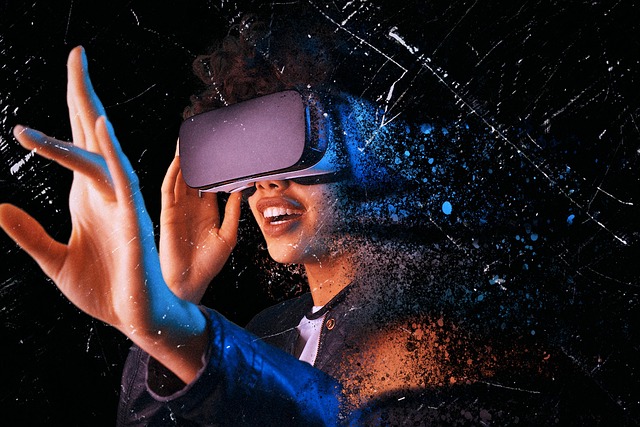AI agents for marketing harness predictive analytics to transform strategies. Through NLP and machine learning, these tools analyze customer data, identify trends, automate tasks, and provide insights for personalized campaigns. In e-commerce, AI optimizes product recommendations, inventory, and demand forecasting. By leveraging real-time interactions, AI agents adapt and improve marketing efforts. They enable efficient data collection, audience segmentation, and preference prediction, enhancing brand engagement and conversions. Success is measured through KPIs like qualified leads, conversion rates, and customer engagement.
“In the ever-evolving digital landscape, businesses are turning to an innovative solution: AI agents for marketing. This cutting-edge technology is revolutionizing predictive analytics, enabling marketers to anticipate customer behaviors and preferences with unprecedented accuracy. From understanding foundational concepts to integrating AI for personalized campaigns, this article guides you through the transformative power of AI in marketing. Discover how data-driven strategies are becoming the new norm and learn about key performance indicators to measure success.”
- Understanding AI Agent for Marketing Fundamentals
- Unlocking Predictive Analytics Potential
- Data-Driven Strategies: A New Paradigm
- Integrating AI for Personalized Campaigns
- Measuring Success: Key Performance Indicators
Understanding AI Agent for Marketing Fundamentals

An AI Agent for Marketing is a game-changer in the realm of predictive analytics, offering businesses an edge in understanding their customers’ behaviors and preferences. This technology leverages advanced algorithms to analyze vast amounts of data, providing valuable insights that can shape marketing strategies. By employing natural language processing (NLP) and machine learning capabilities, these agents can learn from customer interactions, identify patterns, and make accurate predictions about future trends.
The integration of an AI assistant within a marketing team streamlines various processes. For instance, chatbots powered by AI workflow systems can engage in conversations with clients, gathering valuable feedback and personal preferences. This interaction data is then fed into predictive models, enabling marketers to create highly personalized campaigns. Moreover, these agents can automate routine tasks, allowing marketing professionals to focus on strategy and creative execution, ultimately enhancing overall campaign effectiveness.
Unlocking Predictive Analytics Potential

In today’s data-driven landscape, marketing strategies are evolving to leverage predictive analytics, allowing businesses to anticipate customer behaviors and preferences. This is where an AI agent for marketing steps in as a game changer. By utilizing advanced algorithms and machine learning techniques, these intelligent agents can sift through vast amounts of customer data, identifying patterns and trends that would otherwise remain hidden. An AI assistant, such as a sales chatbot, becomes a powerful tool for predicting customer needs, enabling personalized marketing campaigns, and ultimately driving higher conversion rates.
Ecommerce automation is another area where predictive analytics shines. AI agents can forecast product demand, optimize inventory levels, and recommend tailored product offerings to individual customers. This level of personalization not only enhances the shopping experience but also boosts sales. Moreover, these AI assistants can continuously learn and adapt based on real-time customer interactions, ensuring that marketing efforts remain relevant and effective in a dynamic market.
Data-Driven Strategies: A New Paradigm

In the evolving landscape of marketing, data has emerged as a powerful tool, and an AI agent for marketing plays a pivotal role in harnessing its potential. The traditional approach of relying solely on intuition and guesswork is giving way to a new paradigm: data-driven strategies. With advancements in artificial intelligence automation, businesses can now leverage vast amounts of customer data to make informed decisions, predict market trends, and create highly personalized campaigns. This shift marks a significant departure from the conventional methods, where marketing efforts were often hit or miss.
An AI chatbot, as an integral part of this revolution, offers unprecedented opportunities for marketers. It enables efficient data collection and analysis, allowing businesses to segment their audience, understand consumer behavior, and identify patterns that were previously invisible. By employing predictive analytics powered by AI agents for marketing, companies can anticipate customer preferences, tailor their messaging, and ultimately enhance campaign effectiveness. This level of precision in marketing strategies ensures that every interaction with a potential client is optimized, leading to increased conversions and stronger brand engagement.
Integrating AI for Personalized Campaigns

Integrating AI for personalized campaigns offers a significant edge in modern marketing strategies. An AI agent for marketing can analyze vast customer data to predict behaviors and preferences, enabling businesses to create tailored messages that resonate with each individual. This level of customization significantly enhances engagement rates compared to generic marketing approaches.
By leveraging ai automation, companies can optimize their entire marketing funnel, from segmenting audiences to delivering targeted content. In the realm of ecommerce ai, these intelligent agents can even suggest personalized product recommendations based on browsing history and purchase patterns, driving sales and fostering stronger customer relationships.
Measuring Success: Key Performance Indicators

Measuring success is a fundamental aspect of any marketing strategy, and when an AI agent for marketing is involved, it becomes even more critical to define clear Key Performance Indicators (KPIs). These KPIs should align with the specific goals set by the business, whether it’s increasing sales, improving customer retention, or enhancing brand awareness. For instance, an AI automation agency might track the number of qualified leads generated through intelligent marketing campaigns and attribute this success to the AI agent’s predictive capabilities.
Additionally, metrics like conversion rates, click-throughs, and customer engagement levels can provide valuable insights into the effectiveness of AI-driven marketing strategies. A sales chatbot, for example, could be measured by its ability to qualify leads, reduce response times, and increase sales conversions. By closely monitoring these KPIs, businesses can optimize their AI workflows, making data-driven decisions to stay ahead in the competitive market.
An AI Agent for Marketing is transforming the way businesses approach predictive analytics, enabling data-driven strategies that were once impossible. By leveraging advanced algorithms and vast datasets, these agents can predict consumer behavior, personalize campaigns, and measure success through key performance indicators (KPIs). As we navigate an increasingly digital landscape, integrating AI into marketing efforts becomes not just a competitive advantage but a necessity, ensuring businesses stay relevant and resonate with their audiences in meaningful ways.
